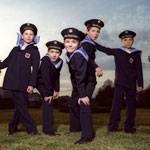The Vienna Boys Choir is coming to The Pullo Center
May 29, 2012

The Pullo Center at Penn State York welcomes The Vienna Boys Choir to its stage on Wednesday, March 6, 2013, at 7:30 p.m. Ticket prices are $65 and $50 and go on sale Friday, June 1, at 10:00 a.m. Pullo Center members can order now. Tickets can be purchased at the Pullo Center Box Office, charge by phone at 717-505-8900, or online at ThePulloCenter.com.
Boys have been singing at the court of the Holy Roman Emperor since the early 15th century. In 1498, more than half a millennium ago, Emperor Maximilian I moved his court and his court musicians to Vienna. He gave instructions that there were to be six singing boys among his musicians. Historians have settled on 1498 as the foundation date of the Vienna Hofmusikkapelle and in consequence the Vienna Boys Choir. Until 1918, the choir sang exclusively for the imperial court, at mass, at private concerts and functions, and on state occasions.
Today there are around 100 choristers between the ages of ten and fourteen, divided into four touring choirs. The four choirs give around 300 concerts and performances each year in front of almost half a million people. Each group spends nine to eleven weeks of the school year on tour. They visit virtually all European countries, and they are frequent guests in Asia, Australia and the Americas
Together with members of the Vienna Philharmonic Orchestra and the Vienna State Opera Chorus, the Vienna Boys Choir maintains the tradition of the imperial musicians: as Hofmusikkapelle they provide the music for the Sunday Mass in Viennas Imperial Chapel, as they have done since 1498. On 1 January 2012, the choir participated for the fifth time in the New Years Concert of the Vienna Philharmonic Orchestra, conducted by Mariss Jansons.
The choirs repertoire includes everything from medieval to contemporary and experimental music. Motets and lieder for boys choir form the core of the touring repertoire, as do the choirs own arrangements of quintessentially Viennese music, waltzes and polkas by Lehar, Lanner, and Strauss.
###
